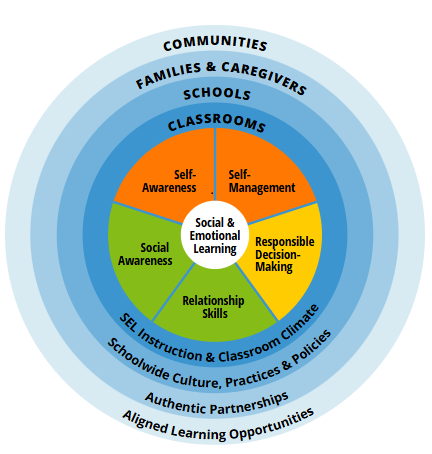
In today’s classrooms, education is no longer limited to academic achievement alone. Schools and educators worldwide are recognizing the crucial role of social and emotional development in shaping well-rounded, resilient, and successful individuals. At the heart of this movement lies the CASEL Framework, a widely respected model for integrating Social and Emotional Learning (SEL) into education systems. But what exactly is CASEL’s SEL Framework, and why has it become such a central part of modern education conversations? Let’s dive deep into its meaning, structure, and impact.
Understanding CASEL
The Collaborative for Academic, Social, and Emotional Learning is known by its acronym, CASEL. CASEL, a preeminent organization founded in 1994, is committed to furthering the study and use of SEL. Its mission is simple yet powerful: to help make evidence-based SEL an integral part of education from preschool through high school.
To achieve this, CASEL introduced a clear framework that defines the core competencies of social and emotional learning, guiding schools, districts, and policymakers in developing comprehensive SEL programs.
What Is the CASEL Framework?
The CASEL Framework identifies five core competencies that individuals need to develop to thrive academically, socially, and emotionally. These competencies are not taught as isolated lessons—they are woven into academic instruction, school culture, extracurricular activities, and community partnerships.

The five core SEL competencies according to CASEL are:
Each of these competencies supports students in managing emotions, setting goals, showing empathy, maintaining positive relationships, and making responsible choices—skills that are essential for success both inside and outside the classroom.
The Five Core SEL Competencies
Let's explore each competency in detail:
1. Self-Awareness
The capacity to identify and comprehend one's own feelings, ideas, and values as well as how they affect behavior is known as self-awareness. It also involves accurately assessing one's strengths and limitations, leading to a well-grounded sense of confidence and purpose.
Key elements include:
Self-aware students can better manage stress, respond thoughtfully to challenges, and build healthy self-esteem.
2. Self-Management
Self-management is the ability to regulate emotions, thoughts, and behaviors in different situations. This includes managing stress, controlling impulses, motivating oneself, and working toward personal and academic goals.
Key skills include:
Developing strong self-management skills helps students stay focused, resilient, and productive.
3. Social Awareness
Understanding and sympathizing with people from different cultures and origins is a component of social awareness. It includes recognizing social norms, understanding ethical standards, and identifying supports and resources.
Important aspects include:
Socially aware students are better equipped to navigate relationships, collaborate with others, and contribute positively to their communities.
4. Relationship Skills
The capacity to build and preserve wholesome, fulfilling connections with a variety of people and groups is known as relationship skills. This competency includes communicating clearly, listening actively, cooperating, resisting inappropriate social pressure, negotiating conflict constructively, and seeking or offering help when needed.
Relationship skills involve:
Strong relationship skills are foundational for success in school, work, and life.
5. Responsible Decision-Making
The capacity to make thoughtful and positive decisions on one's own conduct and social interactions in light of moral principles, security considerations, and societal norms is known as responsible decision-making. It also entails weighing the effects and taking into account one's own and other people's welfare.
Key decision-making skills include:
Responsible decision-making helps students navigate complex situations thoughtfully and ethically.
The Broader Impact of the CASEL Framework
Integrating the CASEL Framework into education benefits more than just individual students. It strengthens schools, families, and communities. Research has consistently shown that SEL programs aligned with the CASEL competencies lead to:
A landmark meta-analysis by CASEL found that students who participated in SEL programs showed an 11 percentile-point gain in academic achievement compared to those who did not.
Beyond academics, SEL prepares students for the workforce by developing critical "soft skills" such as teamwork, communication, adaptability, and problem-solving.
How Schools Implement the CASEL Framework
Effective SEL integration goes beyond standalone lessons. Schools embracing the CASEL Framework typically weave SEL into:
CASEL encourages a systemic approach, meaning SEL isn’t an "extra" activity—it’s a central pillar of how education is delivered.
Challenges in Implementing the CASEL Framework
While the benefits are clear, implementing SEL through the CASEL Framework can face challenges:
Schools that overcome these challenges often see transformative results in student well-being and school climate.
Bottom Line
The CASEL Framework provides a structured, research-backed model for schools to nurture the whole child. By focusing on the 5 key parameters, educators pursuing an Online Master of Arts in Education with SEN can create learning environments where students not only succeed academically but also thrive socially and emotionally. The CASEL Framework offers a roadmap for building these essential life skills—one student, one classroom, and one school at a time.
Get In Touch
UK – Registered OfficeAsian College Of Teachers Ltd (UK)
27, Old Gloucester Street, London – WC1N 3AX, UK
UK Toll Free:Â 0-808-189-1203
www.asiancollegeofteachers.co.uk
All SEN Courses are designed, developed and created by Asian College of Teachers Ltd, United Kingdom. These courses are certified by CPD Certification Service UK and endorsed by NCC Education, UK, and Short Courses from CACHE, UK through Laser Learning UK.
Asian College of Teachers (ACT) undertakes a continuous review of its teacher training courses to ensure imparting high quality education. However, there might be circumstances outside of ACT’s control which might affect its stakeholders like if you are planning to teach in a different country, applying for a teaching license, pursuing higher studies or trying to get the certificate approved by the Ministry of Education (MoE) of a particular country then you can do so with the certificate issued by Asian College of Teachers (ACT). However, each country’s Ministry of Education (MoE) or educational bodies set certain standards that are indispensable for the pursuit of higher studies or teaching in schools in that country. So it can be a possibility that you may be able to use the certificate for higher studies or teaching purposes in one country and not in another. Therefore, we strongly recommend that you investigate thoroughly and check with the relevant authorities regarding the acceptance of the certificate issued by us before you enrol on a particular course. ACT strives to offer high-quality education and its certificates can be valuable for various purposes internationally, but still it is crucial for individuals to verify the specific recognition of the certificate in the country they intend to use it, especially for formal education or professional licensing purposes. This approach ensures that the stakeholders make informed decisions regarding their educational and career paths.
© 2026 Asian College of Teachers. All Rights Reserved. Asian College Of Teachers is a trading brand of TTA Training Pvt. Ltd (India) - CIN U80902WB2016PTC215839, Asia Teachers Training Co., Ltd (Thailand) - Registration No. 0105558193360, Asian College Of Teachers Ltd (UK) - Company Number 9939942 & Asian College Of Teachers LLC, (USA) - Federal Tax Identification Number 30-1261596
Designed by kreativewebtech